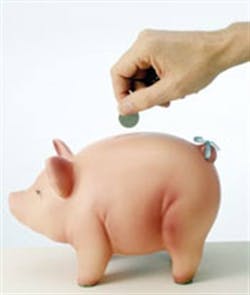This article is one of a series from The Big Book of Small Business by Tom Gegax with Phil Bolsta. Copyright © 2005, 2006 by Tom Gegax. Published by arrangement with HarperCollins Publishers.
Best-selling author Tom Gegax, cofounder and chairman emeritus of Tires Plus stores, served as that company’s chairman and CEO for 24 years. By the time he sold the company in July 2000, it had mushroomed from a concept sketched on a restaurant napkin to a market leader with 150 upscale stores in 10 states and $200 million in revenue.
Thanks to Tom’s warm-hearted, tough-minded approach to management, and his team’s relentless focus on customer service, the company’s turnover rate ranked among the industry’s lowest, and its guest enthusiasm index reached 98%. He was named Modern Tire Dealer’s Tire Dealer of the Year in 1998 and a Midwest Entrepreneur of the Year by Inc. magazine.
In 2000, Gegax founded Gegax Management Systems (www.gegax.com) to help growing companies raise profits and reduce stress through fast and affordable business management guidance.
Call me naïve. It never occurred to me that my new business might fail.
Hey, this was me we’re talking about. Tom Gegax. Four-sport high-school hotshot. Rising star at Shell Oil -- earning promotions like compliments at the prom, tooling around town in a company car, illuminating for service-station managers the finer points of running their businesses. I knew it all.
In reality, I had no idea what I was about to do to myself -- and to my family. Oh sure, my wife Jan and I had talked it through: Should I stay or should I go? Jan was supportive, telling me that I knew best whether I was up to the challenge of opening my own tire store. Of course I was. So I took the leap -- and landed chest-deep in the proverbial creek, with the rapids rising fast.
Don’t get me wrong: I’m glad I went out on my own. I just wish I had better anticipated the toll it would take. If I had been as prepared as you’ll be after reading this article (and future articles), I would have dealt better with the inevitable crises that flew my way -- and dodged many of them altogether. Entrepreneurial types are apt to jump the starting gun. That pedal-to-the-metal mind set is one of our greatest strengths. But it can also be our Achilles’ heel. In our zeal to conquer the business world, we may disregard or overlook these critical start-up issues.
[PAGEBREAK]
Consider the impact on your family. In my acceptance speech for Inc. magazine’s 1995 Midwest Entrepreneur of the Year Award, I wondered aloud whether the price I’d paid was too steep.
In the early years, I was a slave to the business, working miserably long hours. While I did attend most of my kids’ activities, and even coached their baseball and basketball teams, it felt like I was always multitasking, wondering how to replace a key employee who had just resigned or whether I would make the next payroll.
My kids, who quickly learned to recognize when I was zoning out, would jar me back to real time by tapping on my shoulder: “Earth to dad.” As the business grew, I had more flexibility for family time, although it took a lot of focus to keep my mind off business when I was off the clock.
Was it all worth it? Would I do it all over again? Yes -- under two conditions. First, I’d need to know everything in the Big Book so I could escape the straightjacket stress and strain of running a business. That calmer state of mind would fulfill the second condition: a better balance of work and family.
Face the fear. I was 29 years old, my first day off Shell’s payroll, and my wife and two sons were at a Dairy Queen in suburban Minneapolis. We ordered Peanut Buster Parfaits and Dilly Bars. As I handed over a five-dollar bill and took the ice cream, 10 words ambushed my mind: Where will the money come from to pay for these? That thought was more chilling than an Arctic Rush brain freeze. No more checks on the first and 15th. No profit sharing, no company car, no expense account.
Really, I had no idea if my new business could generate enough revenue to support the four of us. That undercurrent of quiet terror was my constant companion for a long, long time.
When in doubt, gut it out. Tell me I can’t do something that I want to do, and I’ll work my butt off to prove I can.
My junior year of high school, there were 15 seconds left in the last basketball game of the season. We were trailing by one point to a much larger school that my small town hadn’t beaten in 20 years.
I had the ball. Dribbling down court, I saw an open teammate streak down the sideline. Misjudging how far to lead him with the ball, I passed it behind him and out of bounds -- and threw away our chance to take the final, potentially game-winning shot.
I was so embarrassed and guilt-ridden that I didn’t show my face in school for two days. The only thing my coach ever said about it was, “Don’t bother going out next year, you won’t make the team.”
[PAGEBREAK]
I loved basketball, so his words lit a bonfire in my belly. I practiced five hours a day, every day, all summer long -- with ankle weights.
Not only did I make the team, I was leading scorer and all-state honorable mention in Indiana, where basketball is right there next to mom, God and country.
That unshakable -- and, in hindsight, borderline delusional -- belief in myself saved my business bacon countless times. At Shell, my manager said I wasn’t tough enough to transfer from the human relations department to the field.
After a year, he relented and assigned me to the toughest part of Chicago, the near South Side, “Bad, Bad Leroy Brown’s” neighborhood.
I helped take South Side dealers from worst to first in tire sales.
As soon as I started my own business, before the paint had even dried on my store signs, a competitor told me straight to my face, “You’re not going to make it, Tom.” Even my equipment supplier had no faith. “I wish you the best,” he said, “but it’s just not going to happen.” Oh, and a major tire supplier refused to supply tires to us because we weren’t big enough.
Perversely, all that only inspired me to build a team that could capture 1.5% of the U.S. tire market, selling over a million tires annually.
My post-Shell cluelessness did have a few advantages. Had I known how hard it was to launch a tire dealership, price and market products, hire and train people, make payroll and pay off loans, I may have stayed in my corporate cocoon.
But leave I did. Head down and plowing through crisis after crisis, I earned a Ph.D. in business management from the school of hard knocks. I can appreciate Winston Churchill’s sentiment when he said, “If you’re going through hell, keep going.”
[PAGEBREAK]
Think about partnering up. Remember the buddy system, it works in business, too. Even a motivated overachiever can’t always go it alone. The right partner is a godsend if he’s rational, caring and willing to compromise-on issues, not values.
It’s hard to come by a partner with integrity, multiple specialties and the flexibility to deal with change. Don Gullett and I complemented each other like McCartney and Lennon. I was the internal face of Tires Plus (conducting meetings, addressing the troops) and outside of the company (for business partners, investors, community leaders). Don was in the trenches getting things done — directing operations and making the trains run on time.
Know your would-be partner inside and out before signing anything. If he’s a social acquaintance, drill down. How would he handle a financial crisis or a delicate employee matter?
Don was a good fit because he had spent 18 months under me as a sales rep at Shell. Still, from the outset I made it clear -- spelled out on paper -- that I would be in charge.
Fifty-fifty splits are dangerous, in my book. Sure, we’d go with Don’s ideas when they were better. But if there was a difference of opinion, the buck stopped with me.
One more reason to team up: it’s lonely at the top. Your partner is the only one who can relate to whatever you’re going through. It may sound like a negligible benefit, but having a trustworthy peer to commiserate and brainstorm with is like enduring personal crises with close family.
Live lean. New businesses gobble up cash, so I looked for every opportunity to save a buck here and make a buck there.
Our first real headquarters was a second-rate office park in a third-rate neighborhood and cost $250 for rent.
Noticing it lacked vending machines, I asked the building’s owner if I could install one myself. That netted $250 a month. Now rent was free.
Labor will likely be your biggest cost. Keep base salaries low by hiring top-notch talent who’ll work their tails off for incentive-based payoffs like commissions, bonuses and stock options.
The more hats you wear yourself, the fewer people you’ll have to hire. In our first year, Don was a one-man wholesale company -- he ordered the products, unloaded them, stocked them, sold them, delivered them and collected payments for them.
[PAGEBREAK]
Initially, anyway, you’ll have to pinch pennies more than you’d like. Our family car was a used, eight-year-old Plymouth station wagon with a hatchet hole in the rear, bought at an auction (we imagined that it had been used in some kind of grisly crime). But it got us where we needed to go. I paid myself enough to cover monthly expenses and plowed the rest back into the company.
Why do young companies Hoover-up so much cash? Other than labor costs, the four main sources of suction are:
* taxes,
* start-up loans (with after-tax money),
* inventory (as stock levels increase), and
* accounts receivable (even if every customer pays on time, you’re still 30 to 90 days behind depending on the terms you offer).
These greenback gluttons can drain morale along with cash. Let’s say you net an annual profit of $400,000. Taxes take $150,000 off the top. Inventory requirements shave off $75,000. Another $75,000 gets tied up in receivables. Oh, and don’t forget those loan obligations that take $100,000.
For you? That leaves exactly zilch.
Now that I’m consulting, I hear it all the time: “I’m working 24/7, sales and profits are increasing, but there’s nothing left for me!” That’s why entrepreneurs need to keep costs low, ride herd on receivables and get creative when they’re under a cash crunch.
In next month’s article, Gegax will take a look at how your communication skills -- including active listening — help you with building and managing business relationships.




